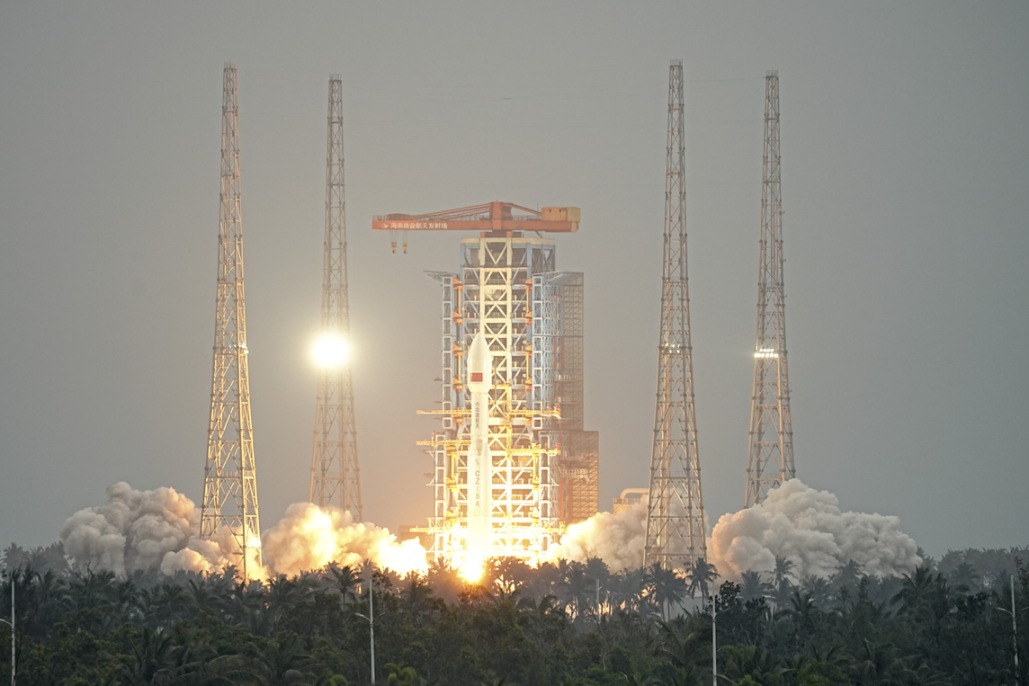Tomb sweeping tributes becoming eco-friendly

Over the years, eco-friendly tomb sweeping in various forms has gained more ground during Qingming, the traditional Chinese festival during which people pay tribute to the dead and worship their ancestors.
In the days around this year's festival, the Beijing All Buddha Cemetery of Overseas Chinese has invited teachers and students from famous conservatories in Beijing to perform gentle live music, providing soothing sounds for mourners.
"With the accompaniment of violin music, mourning the deceased has become elegant and warm," said a Beijing resident who visited the cemetery.
At the Babaoshan Funeral Home in the capital, staff slowly placed paper cranes and paper boats carrying blessings into a small pool. The paper is biodegradable and made of water-soluble wood pulp, with the characters printed with food-grade pigments.
Compared with the Chinese traditions of burning joss paper and setting off firecrackers, water-soluble paper floating is safer and more environmentally friendly, the funeral home said.
People in the Chaoshan region of South China's Guangdong province have a long tradition of worshipping their ancestors.
"This year's Qingming Festival will embrace crowds of people returning home for the tomb sweeping, and we began relevant work last month," said Huang Bingzhuang, deputy director of the civil affairs bureau in the city of Shantou.
Shantou's Xiang'an Yongjiu cemetery has launched an appointment service on its WeChat account to provide more convenience to mourners as they arrange their visiting times.
"Also, local authorities have encouraged the public through media platforms to present fruit and flowers instead of burning paper money," Huang said.
"In the process of ancestor worship, people cherish and appreciate the past while placing their hope in the future," said Huang. "We hope that by advocating for eco-friendly tomb sweeping, the excellent Chinese traditional culture can be propelled forward."
Funerals are of great importance in China, with the "luxury" of funerals and tombs once being used as a standard to evaluate the filial piety of the deceased's descendants.
The funerals of those who died of old age, like Zhao's grandmother, were often grand affairs.
"Promoting eco-friendly burials is part of funeral reform, which embodies social, ideological and cultural progress, and is of great significance to environmental protection and green development work," said You Jianqing, an official from Ningxia's civil affairs department.
In Ningxia, those who choose green burials — such as lawn burials, tree burials and sea burials, which do not involve land (or involve less land) and use fewer non-degradable materials — can enjoy a one-time grant ranging from 2,000 yuan ($290) to 5,000 yuan, as well as a reduction in basic funeral expenses.
Statistics from the regional civil affairs department reveal that eco-friendly burials have been performed for 3,052 deceased individuals in Yinchuan so far. The city has subsidized 24.1 million yuan in basic funeral service fees for cremation.
Xinhua
- Beijing community leads the way in grassroots governance
- HKSAR govt extends thanks to various units for supporting people affected by residential complex fire
- Influencers barred from vulgar, false, or harmful content
- Hangzhou–Quzhou High-Speed Railway begins operations
- China records rise in survival prospects for child and adolescent cancer patients
- Ministry unveils draft revision of the national air quality standards





































